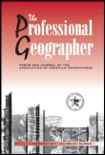
PROFESSIONAL GEOGRAPHER
Scope & Guideline
Pioneering Interdisciplinary Dialogue in Geospatial Studies
Introduction
Aims and Scopes
- Human-Environment Interactions:
This area explores the complex relationships between human activities and natural environments, emphasizing sustainability, resilience, and adaptation in the face of climate change. - Spatial Analysis and Geographic Information Science (GIScience):
The journal frequently publishes articles that utilize advanced spatial analysis techniques and GIS technologies to address various geographical questions, including urban planning, public health, and environmental management. - Social Justice and Equity:
A consistent focus is placed on understanding and addressing issues of social justice, inequality, and representation in geographical research, particularly concerning marginalized communities. - Cultural and Political Geography:
Research in this domain examines the cultural and political dimensions of geography, including identity, migration, and the implications of geopolitical changes on local communities. - Urban Geography and Development:
The journal highlights studies on urbanization, city dynamics, and the impacts of urban policies, particularly in relation to economic development and social inclusion. - Methodological Innovations:
The journal promotes methodological advancements in geography, including participatory mapping, mixed-methods approaches, and the use of digital technologies in research.
Trending and Emerging
- Climate Change and Environmental Justice:
There is an increasing emphasis on the intersection of climate change and social justice, with studies exploring how vulnerable communities are disproportionately affected by environmental issues. - Digital Geographies and Big Data:
The journal is witnessing a rise in research utilizing digital technologies and big data analytics to understand spatial phenomena, including social media data and remote sensing. - Health Geography:
Public health and geographical studies focusing on health disparities, access to healthcare, and the impacts of pandemics are gaining traction, reflecting the ongoing global health challenges. - Migration and Mobility Studies:
Research on migration patterns, mobility, and their socio-economic impacts is becoming a central theme, particularly in light of recent global migration crises. - Intersectionality in Geography:
There is a growing trend towards incorporating intersectional perspectives in geographical research, analyzing how various social categories (e.g., race, gender, class) intersect to shape spatial experiences.
Declining or Waning
- Traditional Physical Geography:
There is a noticeable decrease in publications focused solely on traditional physical geography, such as geomorphology and climatology, as the journal shifts towards more applied and interdisciplinary studies. - Historical Geography:
Research centered on historical geography has become less frequent, with a trend towards contemporary issues and immediate geographic challenges, such as urbanization and migration. - Quantitative Methods in Isolation:
While quantitative methods remain important, there is a waning focus on purely quantitative approaches without qualitative integration, as researchers increasingly favor mixed-methods strategies. - Geography Education:
Although education-related articles have been published, there is a decline in the frequency of discussions specifically focused on traditional geography education practices, reflecting a shift towards broader educational methodologies. - Local Case Studies in Isolation:
Research that solely emphasizes local case studies without broader implications or comparative analyses is becoming less common, as there is a growing interest in global and cross-contextual studies.
Similar Journals
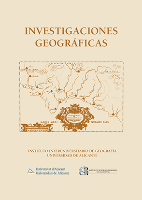
Investigaciones Geograficas-Spain
Fostering collaboration in earth and planetary sciences.Investigaciones Geográficas-Spain is an esteemed academic journal published by the Universidad de Alicante, dedicated to advancing the fields of geography, planning, and development as well as earth and planetary sciences. With its commitment to open access since 1983, the journal ensures that research is readily available to a global audience, facilitating knowledge dissemination and collaborative discourse. As reflected in its 2023 Scopus rankings, it holds a commendable position within the Q3 category in both Earth and Planetary Sciences and Geography, Planning and Development, making it a noteworthy resource for scholars and practitioners in these disciplines. The journal's scope encompasses diverse geographical research, aiming to address pressing environmental and societal challenges through empirical studies and theoretical advancements. By contributing to the knowledge reservoir from Spain and beyond, Investigaciones Geográficas-Spain serves as a vital platform for researchers, professionals, and students seeking to enrich their understanding of geographical phenomena.

CyberGeo-European Journal of Geography
Exploring the Frontiers of Geographical KnowledgeCyberGeo-European Journal of Geography, published by CYBERGEO, is a leading open-access journal that has been at the forefront of geographical research since its inception in 1996. With a dedicated focus on the multifaceted dimensions of geography, the journal aims to disseminate innovative and critical insights into geographical phenomena in Europe and beyond. The journal has established itself in the academic community, currently holding the Q3 quartile ranking in the Social Sciences (miscellaneous) category for 2023 and recognized within Scopus as #428 out of 604, placing it in the 29th percentile. CyberGeo publishes original research articles, thematic issues, and reviews that contribute to the advancement of geographical knowledge, making it an essential resource for researchers, professionals, and students alike. Situated in Paris, France, the journal embraces a truly international perspective and invites contributions that stimulate scholarly debate and further the understanding of spatial dynamics. By providing open access to its content, CyberGeo ensures that its research is accessible to a global audience, promoting knowledge sharing and collaborative exploration in the field of geography.
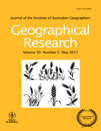
Geographical Research
Innovating the Landscape of Geographical ScholarshipGeographical Research, published by WILEY, is a premier academic journal based in the United Kingdom, dedicated to advancing knowledge in the fields of Geography, Planning, and Earth-Surface Processes. With an impact factor that reflects its high academic caliber, this journal ranks in the Q2 category for Earth-Surface Processes and Q1 in Geography, Planning and Development, highlighting its influential role in shaping contemporary research within these disciplines. The journal's Scopus rankings further underscore its significance, standing at #175 out of 821 in Geography, and #41 out of 179 in Earth-Surface Processes, placing it within the top 78th and 77th percentiles, respectively. Since its inception in 2005, Geographical Research has continuously provided a vital platform for scholars to disseminate innovative research, fostering dialogue and collaboration across disciplines. Although currently not open access, its content remains indispensable for researchers, professionals, and students aiming to deepen their understanding of geographical phenomena and develop strategic insights for planning and development.

TIJDSCHRIFT VOOR ECONOMISCHE EN SOCIALE GEOGRAFIE
Exploring the Nexus of Economics and Social GeographyTIJDSCHRIFT VOOR ECONOMISCHE EN SOCIALE GEOGRAFIE, an esteemed journal published by WILEY, provides a premier platform for the dissemination of cutting-edge research within the fields of economics and social geography. With an ISSN of 0040-747X and an E-ISSN of 1467-9663, this journal has established itself as a pivotal resource, exhibiting a remarkable Q1 ranking in both Economics and Econometrics as well as Geography, Planning and Development for 2023. Notably, it is positioned in the 95th percentile among 821 journals in its category of Social Sciences, and ranks 46th among 716 in Economics and Econometrics, underscoring its influential role in shaping academic discourse. The journal, which has been in publication since 1967 and is anticipated to run through 2024, invites contributions that explore the intricate interplay between economic phenomena and social geospatial dynamics. Researchers, professionals, and students are encouraged to engage with its findings, which are crucial for understanding contemporary socio-economic challenges and innovations on a global scale.

Hrvatski Geografski Glasnik-Croatian Geographical Bulletin
Advancing Knowledge in Earth-Surface ProcessesHrvatski Geografski Glasnik-Croatian Geographical Bulletin, ISSN 1331-5854, E-ISSN 1848-6401, is an esteemed open-access journal published by the Croatian Geographical Society that has been serving the geography community since 1929. Based in Zagreb, Croatia, this journal focuses on a broad spectrum of geographical research, providing a platform for the dissemination of original articles, reviews, and case studies that contribute to the understanding of earth-surface processes and development planning. Although it currently holds Q4 rankings in both Earth-Surface Processes and Geography, Planning and Development, the journal is dedicated to enhancing its impact within the scientific community, aspiring to elevate research visibility and collaborative opportunities. With a commitment to open access, it ensures that all content is readily available to researchers, professionals, and students worldwide, fostering an inclusive environment for geographical scholarship. Engaging with this journal presents an opportunity to stay updated with emerging trends and pivotal studies within the discipline throughout its converged years from 1998 to 2024, making it a vital resource in geography and related fields.

Documents d Analisi Geografica
Bridging Theory and Practice in Earth SciencesDocuments d'Anàlisi Geogràfica is a distinguished academic journal published by Universitat Autònoma de Barcelona, focusing on the fields of geography, planning, and earth-surface processes since its inception in 1988. With an Open Access policy implemented in 2012, the journal aims to facilitate the widespread dissemination of geographical research and insights, accessible to a global audience. Currently ranked in Q3 for both Earth-Surface Processes and Geography, Planning and Development categories, it serves as a vital platform for researchers, practitioners, and students to share their findings and enhance knowledge in these critical fields. The journal is indexed in Scopus, where it stands at rank #470 in Social Sciences and #106 in Earth and Planetary Sciences, reflecting its growing impact in relevant academic communities. Based in Barcelona, Spain, Documents d'Anàlisi Geogràfica continues to contribute substantially to geographical scholarship by exploring contemporary issues and advancements in a rapidly evolving world.
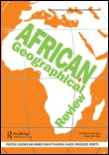
African Geographical Review
Navigating Earth-Surface Processes Across the African ContinentAfrican Geographical Review is a pivotal academic journal published by Routledge Journals, Taylor & Francis Ltd, whose mission is to advance knowledge and understanding of geographical dynamics across the African continent. With an ISSN of 1937-6812 and an E-ISSN of 2163-2642, this journal consistently delivers high-quality research, showcasing innovative perspectives and interdisciplinary approaches within the fields of Earth-Surface Processes and Geography, Planning and Development. Recognized in 2023 with a Q2 ranking in these categories, it ranks #231 out of 821 in Social Sciences and #63 out of 179 in Earth and Planetary Sciences according to Scopus metrics, reflecting its substantial impact and relevance. Featuring research that spans various geographic themes, the journal not only champions academic inquiry but also fosters a deeper understanding of spatial and environmental challenges unique to Africa. Engaging with a diverse audience of researchers, professionals, and students, the African Geographical Review serves as an indispensable resource for those committed to enhancing geographic scholarship and informing sustainable development practices across the continent.

Southeastern Geographer
Exploring the Intersections of Geography and SocietyThe Southeastern Geographer is a prominent academic journal published by the Association of American Geographers, dedicated to advancing knowledge in the fields of Earth and Planetary Sciences and Geography, Planning and Development. With an ISSN of 0038-366X and an E-ISSN of 1549-6929, this journal has been a staple in geographical scholarship since its inception, offering a platform for diverse research that spans over four decades, specifically from 1979 to 1994 and then from 1996 to 2024. The journal is currently classified in the Q3 category within its fields, indicating its significant influence in shaping contemporary geographical discourse. Researchers, professionals, and students alike benefit from its rigorously peer-reviewed articles that explore regional studies, environmental issues, and sociocultural dynamics, making it essential for anyone interested in the interconnectedness of geography and society. As a vital resource for advancing geographical education and research, the Southeastern Geographer continues to engage its audience with innovative insights and scholarly contributions.
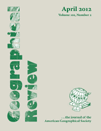
GEOGRAPHICAL REVIEW
Transforming Perspectives on Spatial and Environmental ChallengesGEOGRAPHICAL REVIEW, published by Taylor & Francis Inc, is a premier academic journal recognized for its influential contributions to the fields of geography and earth-surface processes. With an ISSN of 0016-7428 and an E-ISSN of 1931-0846, this journal has established itself as a vital resource for researchers, professionals, and students alike. The journal maintains a strong reputation with a Q1 ranking in both Earth-Surface Processes and Geography, Planning and Development, reflecting its scholarly impact and relevance in the academic community. Additionally, it holds a notable position in Scopus rankings, placing #181 out of 821 in Social Sciences and #45 out of 179 in Earth and Planetary Sciences. Although it is not open access, the GEOGRAPHICAL REVIEW remains essential for those seeking to expand their understanding of spatial analysis and environmental processes from its historical inception in 1969 to its ongoing publications through 2024. Explore rigorous research articles, critical reviews, and innovative studies that shape the discourse in geography and earth sciences today.
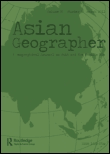
Asian Geographer
Advancing Knowledge in Asian Geography and DevelopmentAsian Geographer is a prominent journal published by Routledge Journals, Taylor & Francis Ltd, recognized for its significant contributions to the field of geography, planning, and development. With an ISSN of 1022-5706 and an E-ISSN of 2158-1762, the journal offers a platform for high-quality, peer-reviewed research that addresses vital geographical issues, particularly within the Asian context. The journal's commitment to fostering informed discourse is reflected in its Q2 category ranking in the field of Geography, Planning and Development as of 2023, and its Scopus ranking of #274 out of 821 in the same category, placing it in the 66th percentile. The Asian Geographer serves as an essential resource for researchers, professionals, and students alike, ensuring access to a wealth of knowledge that influences policy and practice. It continues to publish original research and reviews as it converges to present significant developments in geography from 1982 to 1987, 1991 to 1995, and from 2015 to 2024. This journal is vital for anyone looking to deepen their understanding of geographical dynamics in Asia and beyond.